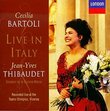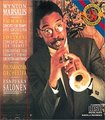| All Artists: Hector Berlioz, Colin Davis, Dresden Staatskapelle Title: Berlioz Overtures Members Wishing: 0 Total Copies: 0 Label: © 1998 BMG Entertainment Release Date: 7/13/1999 Genre: Classical Styles: Forms & Genres, Theatrical, Incidental & Program Music, Symphonies Number of Discs: 1 SwapaCD Credits: 1 UPC: 090266879021 |
Search - Hector Berlioz, Colin Davis, Dresden Staatskapelle :: Berlioz Overtures
 | Hector Berlioz, Colin Davis, Dresden Staatskapelle Berlioz Overtures Genre: Classical
|
Larger Image |
CD DetailsSimilarly Requested CDs |
CD ReviewsDazzling, Loving Performances Exceed All Expectations. D. Roth | Pleasant Hill, Ca | 03/16/2000 (5 out of 5 stars) "If you have feared that complacency or advancing years have weakened Davis' place as a major Berlioz champion, hear this disc as soon as possible! With the Dresden Orchestra achieving both crystalline textures and blazing power, he illuminates this volcanic but finely-wrought music as brilliantly as he ever has. The Corsair Overture has everything: rhythmic swagger,steady yet flexible pacing, ,transparent winds and strings, and electrifying ( but affectionate) brass playing. The sound also successfully balances sharp detail with a powerful resonant glow." The curtain has already gone up... Bob Zeidler | Charlton, MA United States | 04/04/2003 (5 out of 5 stars) "...on the Louis-Hector Berlioz Bicentennial, and I'm already more than three months late for the start of the celebratory bash. And what better way to start it than with this splendid album of curtain raisers by Berlioz? Sir Colin Davis is surely one of our most authoritative Berlioz specialists living today, now celebrating his own 75th year by a year full of Berlioz performances. (The oldest Davis/Berlioz recording in my own library dates from 1961: his recording of "L'Enfance du Christ" on the L'Oiseau-Lyre [London] label, many years before he was knighted, but likely not to be his first Berlioz recording despite its age.) In this album, Davis has put together what must be the definitive collection of overtures by Berlioz. It is virtually complete, lacking only the early "Rob Roy" Overture, and the selections are not "diluted" by any of Berlioz's incidental music from his larger works that often gets included in such anthologies. At over 75 minutes, it is a very "full" album; there wouldn't have been room for "Rob Roy," or any incidental music, for that matter. Berlioz gets - and deserves - much credit for revolutionizing music in the first half of the 19th century. Aside from being "the first true Romantic," we can number among his contributions the enlarging of the Classical-period orchestra to the Romantic-period orchestra (something resembling the modern orchestra we know today), the addition of a number of instruments to this orchestra, the concept of "programmatic" music, as well as other ideas and developments that were to be absorbed by, for example, Liszt and Wagner. But Berlioz has also been criticized by some for being undisciplined and wilful and unorthodox - even "primitive" - in his understanding and implementation of music structure - particularly counterpoint - and harmony. That much of this unorthodoxy often resulted in unique, often "surprising," music is largely beside the point. In a sense, this bicentennial couldn't come soon enough, from the perspective of reconsidering and reassessing his uniqueness. One can hope that such a thorough review and traversal of his works through this year (2003) will at last bring him more into the mainstream, rather than continuing to be considered a "fringe" composer; even a musical "dead end." Well, no need to worry about such matters where these overtures are concerned. Their relative brevity - as compared, for instance, with his larger "dramatic" works - largely guarantee that the "waywardness" too often attributed to Berlioz is for all intents absent. Yet the overtures manage to capture the mercurial fleetness and brilliance of both composition and orchestration that set his music apart from that of his contemporaries. These works span Berlioz's entire composing career, from the early "student" work "Les Francs Juges" to the overture for his final staged work, "Béatrice et Bénédict" (based on Shakespeare's "Much Ado About Nothing"). In a sense, they offer "time travel" over his working career, and in fact if listened to in chronological order of composition give a sense of how his compositional artistry developed over his adult life. (Those of you having programmable CD players who are interested in hearing the overtures in this order should program them to play the tracks in the following order: 1 [1825], 2 [1828], 3 [1831], 7 [1836], 4 [1843], 6 [1844], and 5 [1862].) There is not a one of these overtures that is less than interesting and a marvel in its own right in terms of Berlioz's mastery of orchestration. But of course each of us is entitled to have his or her own favorites. Aside from "Le Carnaval romain" (without question his most popular overture), my personal favorites are "Béatrice et Bénédict," "Le Corsaire," "Benvenuto Cellini" and "Les Francs Juges." In fact, this last one (his early "student" work), seldom heard in the concert hall these days, is fascinating to me in terms of how much it initially reminds one of a Beethoven overture in its opening pages (at a time in Berlioz's life when he was yet to hear his first Beethoven work), but - soon enough after these opening bars - is full of novel thematic and orchestrational ideas that could only come from Berlioz's pen. All of these works, thanks to their idiosyncratic thematic, rhythmic, dynamic and instrumental workings, require a sympathetic "master's touch" if their brilliance and uniqueness are to be properly rendered. Sir Colin Davis is clearly a master in this regard; he, like few others, captures what we might call "the essence of Berlioz." While Davis has been long associated with the London Symphony Orchestra, as well as the Boston Symphony Orchestra as principal guest conductor, he also has long held tenure at the Dresden Staatskapelle Orchestra as an honorary conductor. And the Dresdeners really outdo themselves in these overtures, playing with a security and a finesse not normally associated with a German orchestra in such obviously French repertoire. The recorded sound (from the Lukas-Kirche in Dresden) is simply splendid; some of the very finest I've heard in recent years on the RCA Victor Red Seal label. Truly, a great "first pick" in celebrating the Berlioz Bicentennial Bash. Recommended without reservation! Bob Zeidler" A great Berlioz conductor in low gear Santa Fe Listener | Santa Fe, NM USA | 09/30/2005 (3 out of 5 stars) "Davis had a long tenure in Bavaria and made a lot of recordings for RCA during that period. But he was often slack and uninvolving in his music-maing, to the point that one wondered why he stayed on. Now that he is back with the London Sym., Davis sounds much more his old self, though he still lapses into fits of sleepwalking.
This collection of Berlioz overtures is careful and detailed, and in very good sound. But who cares? Without fire and passion Berlioz simply isn't Berlioz. Go back to Davis's ealaier CD of overtures on Philips, dating from the Sixties and Seventies when he was younger and much more energetic. This collection is second-best at best." |

 Track Listings (7) - Disc #1
Track Listings (7) - Disc #1






